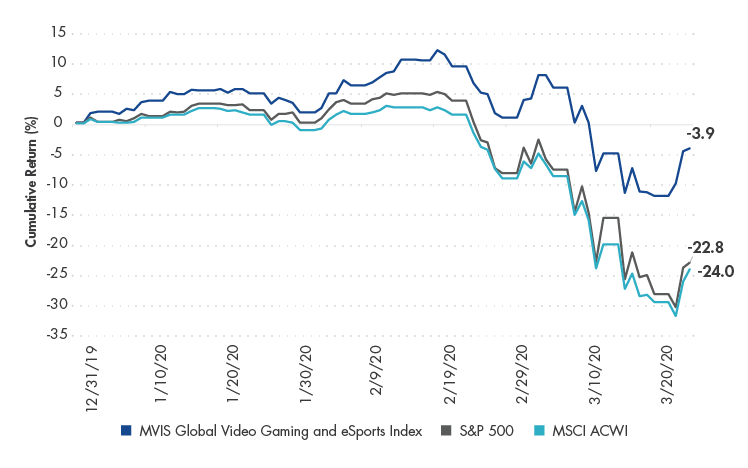Video Games & Esports: The MVPs of Quarantine
01 April 2020
The vast majority of business around the world are facing extreme uncertainty, as consumers are forced to stay at home, avoid contact with other people, and essentially wait for the viral panic to blow over. As people stay at home for extended amounts of time, more and more are turning to video games and esports as a means to entertain themselves.
Video Game Stocks Have Weathered the Storm
While it may seem counter-intuitive that a basket of communication services and technology stocks outperform during a de-risking selloff, that’s exactly what has happened over the last few weeks. While this should not be misinterpreted as guarantee for future results, on both a year-to-date basis and from the market top, video game stocks have outperformed broad equity benchmarks by a wide margin. How could this be?
MVIS Global Video Gaming and eSports Index Returns
31/12/2019 - 25/03/2020

Source: Morningstar
Video game and esports stocks are uniquely positioned to weather this economic recession in which the vast majority of the population is forced to stay inside for extended periods of time. Across the spectrum of the industry, including live-streaming, esports competition and concurrent users playing, analysts have noted a significant increase in the number of people logging on to play video games. What are people going to do if they are stuck at home for an extended period of time on a mandatory lockdown? Play video games—with themselves and each other.
Video Games are Setting Records and Breaking the Internet
Video games and esports have witnessed a sharp increase in engagement around the world since the virus broke out. We view this phenomenon as an acceleration of trends that were already in place, as opposed to a short-term fad that will reverse once the virus fears subside. Here are few noteworthy highlights that have come out since the virus broke:
Activision launched Call of Duty: Warzone and within 10 days passed 30 million players1. This game’s launch is important for a number of reasons. First, it follows the “game as service” model, where the game is free to play and collects revenues from smaller in-game transactions. Second, Call of Duty represents an IP that is over 15 years old. This speaks to the longevity of a given IP, and how important it is for publishers to keep users engaged and caring for years (if not decades).
Steam set a new record for online concurrent players with 20 million people logged onto the service at the same time2. Steam is a video game platform that allows gamers to buy and play video games via their digital library. In a Twitter post, the company directly attributed the record to people staying home due to coronavirus.
Italy experienced a 70% increase in internet usage3, which was largely attributed to video gaming. With the entire country of Italy on some form of lockdown, consumers have flocked to online gaming, which led to bandwidth issues for Italy’s largest internet service provider.
Esports Emerges as Clear Winner
In the last few weeks, the majority of live sporting leagues around the globe have cancelled all upcoming events, including the NBA, NCAA’s March Madness, and NASCAR, to name just a few. Meanwhile, some professional esports leagues, like Activision’s Call of Duty league, have transitioned to online-only matches to allow the continuation of play and to allow fans to keep following the season. While the matches won’t be held in front of a live audience, the competition will go on.
With the cancellation of all live races until at least May, both NASCAR and Formula 1 have held electronic competitions with actual racing professionals, who used simulator rigs to race each other remotely. Racing is unique because the machines used in the race are common training tools for both new and experienced drivers. The competitors were sitting in a seat with multiple screens, with the same basic cockpit that they would have if they were racing a real car.
NASCAR’s race was broadcast on Fox Sports 1 and drew over 900,000 viewers, making it the most-watched broadcast TV esports event in history4. Fox has committed to covering the remainder of the digital racing season on broadcast TV as it unfolds. As the shutdown of traditional sports leagues and tournament drags on, we expect to see more and more traditional sports organizations make progressive steps into the esports ecosystem that may last well after this crisis is over.
Video Gaming Growth is a Trend, Not a Fad
The recent spike in video game engagement can be directly tied to the viral outbreak, but we view this as an acceleration of the following trends that have been in place for years:
Consumer demand for online, interactive entertainment. Since the launch of social media in the early 2000s, it has become clear that people love to hang out online and interact with each other. The rise of MySpace and Facebook crystallized and heightened people’s social connections by placing them online for the world to see. In the last few years, video games have naturally evolved into a form of social media, where friends can congregate online, and play their favorite games together.
Fragmentation of digital media landscape. Netflix, Hulu, Disney+….Fortnite? As the cord-cutting phenomenon has unfolded, consumers have been given the opportunity to customize their entertainment options. Increasingly, consumers are bucketing a subscription to a video game as part of their overall package. In their 2019 annual report, Netflix specifically mentioned Fortnite as a bigger competition than HBO. The beauty of the “game as service” models is that potential long-term customers are given unlimited free samples, in the form of a free-to-play game structure. It’s much easier to spend $10 per month on a subscription for a favorite game, than to spend $60 on a game up-front that might not provide as much long-term enjoyment.
Demographic shifts. Underpinning these seismic shifts in how people play, consume and interact with others, lies the natural ageing of the population. Younger consumers (30 and below) have grown up online and on their parent’s phones and iPads. According to the Entertainment Software Association, 65% of American adults play video games5. As Millennials have grown into adults, they have continued to spend time and money on playing video games.
Investing in Video Gaming and Esports
Determining which games will become hits is difficult, and investors may wish to invest in a diversified basket of Video Gaming and Esports stocks. Such an approach may allow investors to express a view on the sector without having to know which specific stock will outperform over the future. Given the fact that video gaming and esports companies are highly dependent on patent rights and changes in consumer preferences as well as data privacy and cyber security regulations, such investments should however always be part of an overall further diversified investment program. The index methodology which guides VanEckTM Video Gaming and eSports UCITS ETF (ESPO) provides exposure to companies in the video gaming and esports industries.
Currently, the MVIS® Global Video Gaming and eSports Index is heavily tilted towards video game publishers (including the publicly traded companies that operate the largest esports leagues) and semiconductor companies. As the esports industry matures, smaller esports names, such as streamers like HUYA and Modern Times Group, could grow to become a meaningful part of the Index. In the interim, the index captures the esports phenomenon as part of the broader evolution of video gaming, creating awareness of the industry’s potential to reshape how people spend their time and entertainment dollars.
To learn more about ESPO and the high growth potential of the global video gaming and esports industry, visit vaneck.com/ucits/esports/.
1Source: Activision. https://twitter.com/CallofDuty/status/1241035908079480832?s=20
2Source: Steam. https://twitter.com/SteamDB/status/1239180882826715136
3Source: Bloomberg. https://www.bloomberg.com/news/articles/2020-03-12/housebound-italian-kids-strain-network-with-fortnite-marathon?sref=Z5DS0TKc
5Source: https://www.theesa.com/esa-research/2019-essential-facts-about-the-computer-and-video-game-industry/
MVIS® Global Video Gaming and eSports Index is the exclusive property of MVIS (a wholly owned subsidiary of Van Eck Associates Corporation), which has contracted with Solactive AG to maintain and calculate the Index. Solactive AG uses its best efforts to ensure that the Index is calculated correctly. Irrespective of its obligations towards MV Index Solutions GmbH, Solactive AG has no obligation to point out errors in the Index to third parties. The VanEck Video Gaming and eSports UCITS ETF is not sponsored, endorsed, sold or promoted by MV Index Solutions GmbH and MV Index Solutions GmbH makes no representation regarding the advisability of investing in the Fund.
Informations importantes
À des fins d’information et de publicité uniquement.
Ces informations proviennent de VanEck (Europe) GmbH qui a été désignée comme distributeur des produits VanEck en Europe par la société de gestion VanEck Asset Management B.V., de droit néerlandais et enregistrée auprès de l’Autorité néerlandaise des marchés financiers (AFM). VanEck (Europe) GmbH, dont le siège social est situé Kreuznacher Str. 30, 60486 Francfort, Allemagne, est un prestataire de services financiers réglementé par l’Autorité fédérale de surveillance financière en Allemagne (BaFin). Les informations sont uniquement destinées à fournir des informations générales et préliminaires aux investisseurs et ne doivent pas être interprétées comme des conseils d’investissement, juridiques ou fiscaux. VanEck (Europe) GmbH et ses sociétés associées et affiliées (ensemble « VanEck ») n’assument aucune responsabilité en ce qui concerne toute décision d’investissement, de cession ou de rétention prise par l’investisseur sur la base de ces informations. Les points de vue et opinions exprimés sont ceux du ou des auteurs, mais pas nécessairement ceux de VanEck. Les avis sont à jour à la date de publication et sont susceptibles d’être modifiés en fonction des conditions du marché. Certains énoncés contenus dans les présentes peuvent constituer des projections, des prévisions et d’autres énoncés prospectifs qui ne reflètent pas les résultats réels. Les informations fournies par des sources tierces sont considérées comme fiables et n’ont pas été vérifiées de manière indépendante pour leur exactitude ou leur exhaustivité et ne peuvent être garanties. Tous les indices mentionnés sont des mesures des secteurs et des performances du marché commun. Il n’est pas possible d’investir directement dans un indice.
Toutes les informations sur le rendement sont historiques et ne garantissent pas les résultats futurs. L’investissement est soumis à des risques, y compris la perte possible du capital. Vous devez lire le Prospectus et le DICI avant d’investir.
Aucune partie de ce matériel ne peut être reproduite sous quelque forme que ce soit, ou mentionnée dans toute autre publication, sans l’autorisation écrite expresse de VanEck.
© VanEck (Europe) GmbH
Inscrivez-vous maintenant à notre newsletter
Related Insights
Related Insights
06 janvier 2025
20 novembre 2024
14 novembre 2024
16 décembre 2024
20 novembre 2024
14 novembre 2024
11 novembre 2024





